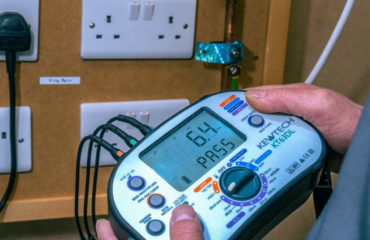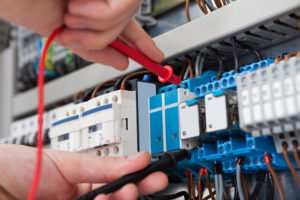It is well known that electrical problems are among the most common causes of fire in commercial properties, can cause a higher percentage of damage, and are listed high in
the causes of workplace injuries, i.e. burns, shocks or indeed, fatalities.
For that reason, electrical safety is a high priority  for insurance companies when looking at the procedures and systems a business has in place, particularly as many electrical issues occur when a property is empty.
for insurance companies when looking at the procedures and systems a business has in place, particularly as many electrical issues occur when a property is empty.
Any large and successful commercial business with the correct safety infrastructure in place, will already be aware of the implications of electrical safety issues, but start-ups and fast-emerging businesses often underestimate the impacts amid the hunger for growth and other more motivating priorities.
The primary concern for every party with a duty of care will always be the loss of life that can occur from electrical safety issues. Alas, after that, many businesses fail to appreciate the potential impact on their operations.
These can include:
- Damage to property/buildings, equipment, stock, wiring infrastructure, carpets and decoration
- Loss of computer data which can debilitate a business and prevent it functioning.
- Cost of downtime, temporary closure and absenteeism.
- Loss of business, reputation and possible prosecution.
Quite apart from the dangers to employees and visitors, electrical fire implications can be structural and can be caused after the event through smoke and water damage or contamination.
But electrical safety is also fraught with hidden dangers, in a very literal sense. While exposed wires and faulty appliances, sockets and light fittings are usually visual, many electrical faults are found in outdated wiring, overloaded circuits and a lack of earthing or bonding, which are not able to be identified by a simple or casual visual inspection.
There are other implications of electrical faults which are also not immediately obvious. Even light smoke damage can short out electronics and cause overheating, and smoke can also be corrosive, so can set off a slow deterioration in wiring and circuitry. In retail units and warehousing, smoke damage can affect stock and hazardous materials could contaminate other materials, people and the environment, causing much wider issues.
Naturally, insurance companies take a dim view of businesses that do not have the correct systems in place to address loss prevention, and not keeping up-to-speed with the constantly changing electrical regulations is not an excuse. Regular inspection and testing programs are a staple part of the health and safety framework of any large commercial business.
Fire safety audits, risk assessments, emergency lighting, evacuation plans and PAT testing are statutory requirements for commercial properties, but if there are large electrical panels and equipment and machinery on site, thermal imaging surveys and full wiring inspections should be carried out periodically, to identify those un-seen problems.
It is no surprise that electrical safety is governed by such strict and ever-changing regulations, given the nature of the hazards, but also the severe, often irreparable, implications to businesses through loss of life, stock, equipment or merely reputation, the costs of maybe having to close the business for a couple of weeks or months, and even, ultimately, the threat of prosecution.
In essence, no business can afford to understate the importance of dedicating the fully appropriate resources to electrical safety. In fact, it quite simply isn’t an option.
Source: http://www.electricaltimes.co.uk/news/story/why-electrical-safety-in-large-commercial-businesses-is-so-important




